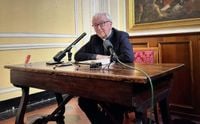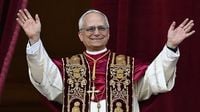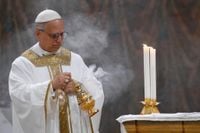A British cardinal involved in the recent papal conclave has revealed insights into the election of Pope Leo XIV, describing the atmosphere as fraternal and devoid of the high-stakes drama depicted in films. Cardinal Vincent Nichols, 79, who leads the Roman Catholic Church in England and Wales, was one of 133 cardinals participating in the conclave and shared his observations with the media following the event.
Cardinal Nichols recounted how Pope Leo XIV, formerly Cardinal Robert Prevost, reacted to his election. He stated, "He took it very matter of factly, there was no real emotion. He took it all in his stride." The cardinal noted that there was a palpable sense of elation when Pope Leo accepted his position, a moment Cardinal Nichols witnessed just a few feet away. He remarked on the new pope's calm demeanor, saying, "He is very calm, clear in his mind, decisive, and I’ve seen him resolve difficulties that didn’t leave enemies behind him, and he can pull people together."
In a striking historical reference, Cardinal Nichols suggested that Pope Leo XIV 'won't be afraid of tyrants,' likening him to Pope Leo the Great, who famously turned back Attila the Hun in 452 AD. When asked if he was alluding to former President Donald Trump, Nichols responded, "You might hear that, I didn’t say it." This comment has sparked discussions about the potential dynamics between the new pope and the U.S. administration.
The conclave was marked by a delay in signaling the election results, as Cardinal Nichols explained that black smoke, indicating no pope had been elected after the first vote, was delayed by more than two hours. He attributed this delay to papal priest Raniero Cantalamessa, who overran his sermon by nearly an hour, leaving a crowd of 45,000 outside the Vatican in suspense. Cardinal Nichols stated, "I think it’s well known that Fr Cantalamessa gave a very long talk…it must have been an hour or more."
Reflecting on the conclave process, Cardinal Nichols described it as a time of great patience and fraternity among the cardinals. "There was a remarkable sense of fraternity, with people from all over the world," he said. He emphasized the meticulous nature of the voting process, which required each of the 133 cardinals to take a solemn oath of secrecy before casting their votes. "Each vote took quite a bit of time," he noted, explaining that the process taught him the virtue of patience, which he found to be a creative experience.
As the conclave unfolded, Cardinal Nichols expressed a deep sense of connection with his fellow cardinals. "I went into each meal and just sat down where there was a chair, next to whoever it was. I didn’t get a sense of people trying to gather in clusters or in pressure groups or any of that," he explained. Unlike the dramatic portrayals in the film Conclave, which depicts a tense and scheming atmosphere among cardinals, Nichols asserted that the real-life experience was far more congenial. "At no point did I feel there was the slightest bit of rancour or somebody trying to promote themselves or even block somebody else," he said.
Pope Leo XIV's election was confirmed on the fourth ballot, with white smoke emerging from the Sistine Chapel just over 24 hours after the conclave began. Cardinal Nichols described the moment of acceptance as one filled with elation, stating, "That brought a round of applause." He highlighted Pope Leo's extensive background, noting that the new pope has been a teacher, diocesan bishop, and member of the Roman Curia, which made it clear that he was well-suited for the papacy.
In the wake of Pope Leo's election, his brother John revealed that he had watched the film Conclave to prepare for the momentous occasion. John shared a light-hearted moment, saying, "First we do Wordle, because this is a regular thing. Then we do Words With Friends [a virtual game like Scrabble]. It’s something to keep his mind off life in the real world." This anecdote adds a personal touch to the often solemn atmosphere surrounding the papal election.
Looking ahead, Pope Leo XIV's inaugural mass is scheduled for May 18, 2025. As the new pontiff prepares to take on his role, there is much anticipation regarding his approach to global issues and his potential interactions with political leaders, including Donald Trump. UK theologian Professor Anna Rowlands shared her perspective, stating that while Pope Leo may not be confrontational, his messages will likely be challenging. She remarked, "He’s unlikely to be confrontational, I think, because of his nature, and yet I think the content of what he says will be quite challenging."
The Vatican has confirmed that Pope Leo XIV will be formally installed at a mass on May 18, marking a significant moment for the Catholic Church and its followers worldwide. As Cardinal Nichols encapsulated, the conclave experience was deeply spiritual and a time of reflection, camaraderie, and hope for the future of the Church.






